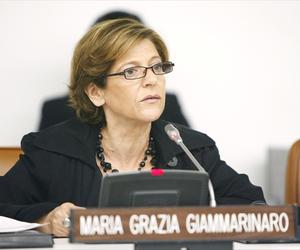UN Rights expert acknowledges Cuban fight against trafficking
- Submitted by: Juana
- Havana
- Politics and Government
- 04 / 15 / 2017

Maria Grazia Giammarinaro, UN Special Rapporteur on the Human Rights of Victims of Trafficking in Persons, especially women and children, recognized the political will and strengths of Cuba to prevent this global scourge.
During a press conference in this capital, the independent researcher of the UN Human Rights Council weighed up government action and perceived good practices, with a preventive approach, to combat trafficking in persons.
In this regard, Giammarinaro praised the National Plan of Action for the Prevention and Confrontation of Human Trafficking (2017-2020), while recommending to pay attention to its operation, and to delve into legal aspects and issues related to the identification of victims of that scourge.
The expert acknowledged that the existence of a universal and free education and health system, coupled with a successful mechanism of social security in Cuba, reduce the vulnerabilities that can trigger trafficking events.
She called, in that sense, not to discard other situations of weakness that can generate it, "because no country is immune to this phenomenon," she said.
Giammarinaro mentioned among the island's strongholds the existence of multiple agreements of international cooperation that include this subject, "something very important since there are cross-border cases".
She added among the good practices identified the participation of women in economic and social life, in addition to the work of institutions such as the National Center for Sex Education, CENESEX.
The Special Rapporteur mentioned that during her visit Cuba, she nevertheless examined situations that could lead to trafficking in persons.
She pointed out that the areas of concern correspond to the need to identify facts about child abuse in the family context, as well as people who use all their resources to migrate and are stranded in third countries.
She also called attention to cases of young professionals who get a temporary employment contract abroad, and when they reach their destination are forced to prostitute or do other work different from that went to do in the first place.
She also referred to other issues such as the decriminalization of prostitution, the relevance of strengthening the legal system and constant monitoring of situations that could be exploited by traffickers.
Giammarinaro was pleased with her stay on the island, and mentioned that she expects this to be a starting point to lead a more profitable dialogue with all elements related to the human rights system.
She said that the results of the meeting will be included in a document, "which will be attached in my next thematic report to the Human Rights Council and the United Nations General Assembly."
As part of its activities in Cuba, the Special Rapporteur met with members of civil society organizations, as well as with Foreign Minister Bruno Rodríguez; President of the Parliament, Esteban Lazo, and the Minister of Justice, Maria Esther Reus.
Comments